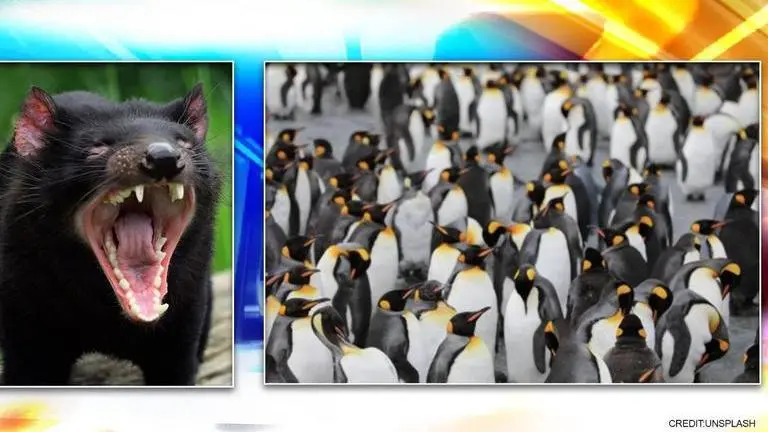Updated 24 June 2021 at 15:32 IST
Tasmanian devils wipe out over 3,000 penguins on tiny Australian island
The STDP was a joint initiative of Australian and Tasmanian governments which was established in 2003 to introduce Tasmanian devils on Maria Island.
- World News
- 4 min read

World's largest surviving carnivorous marsupials ‘Tasmanian devils’ were given a safe harbour on an island abound in the ‘little penguin’ population. Now, they’re devouring the endangered penguins to the point of wiping the mammals out of their habitat.
[Credit: The Maria Island Walk]
The popular Maria Island, now home to the Tasmanian devils, is located off the east coast of Tasmania. It is a solitary Australian National Park that can be reached by ferry or plane. The threatened predator was introduced to Maria Island by the environment conservationists under the Save the Tasmanian Devil Program (STDP) which was aimed to stop the extinction of the Tasmanian devil due to Devil Facial Tumour Disease (DFTD).
The STDP, a joint initiative of the Australian and Tasmanian governments, was established in 2003 following a national workshop of specialists on the decline of the Tasmanian devil. There were looming fears of the marsupial’s permanent endangerment due to the spread of the facial disease. DFTD is a highly transmissible ailment of the Tasmanian devil population that was transmitted to others with biting, fighting and copulation in their natural habitat, the coastal heath, open dry sclerophyll forests.
Advertisement
[Credit: Unspalsh]
However, according to a report issued by BirdLife Tasmania, the marsupials, that noticeably grew in population from 28 to an estimated 100 between 2021-2016, have been “eliminating” the penguins on the island. It is also threatened the colony of the medium-sized long-winged, short-tailed petrel family sea bird species called the ‘shearwater’ according to the Birdlife findings published its findings in the journal Biological Conservation.
Advertisement
[Shearwater bird. Credit: Twitter/@americanbeetles]
[Credit: Twitter/@SeabirdingJP]
The introduction of devils increased predation pressure on shearwaters, and the colonies continued to decline, reaching zero occupancies within four years of devil introduction. The penguins were also significantly reduced. The park produced an estimated figure of 3,000 pairs of penguins, that it said, have declined from the island due to the Tasmanian devils’ hunting habits. There were anecdotal changes also noticed in the ground-nesting bird's Cape Barren geese on Maria Island, trying to escape these marsupials.
Re-establishing island for penguins
In a televised remark with CNN on Wednesday, the convenor of BirdLife Tasmania Eric Woehler expressed hope as he indicated that the decimated little penguin population can most likely be restored once the predatory activity of the devils is taken care of. It is although uncertain if the sanctuary would opt for conservation translocations as a means to minimize the Tasmanian devils’ threats on its native prey species.
The convenor agreed that the park has witnessed the “catastrophic ecological impact” on the fauna across the Island since transplanting the insurance population of devils in the habitat that is home to several important species on the verge of mass eradication. The little penguins, however, are one of the two most threatened seabird species in the world. According to Birdlife International, it isn’t the Antarctic penguins that are officially endangered, but the little penguin population that exists at Manly, in Sydney's North Harbour is.
[Cape Barren Geese. Credit: Stewart Monckton/ Twitter/@SCMONCK]
[Penguins. Credit: unsplash]
According to the World Wide Fund for Nature (WWF) Australia, the little penguins can now only be found in southern Australia, as well as few in New Zealand. In Australia, little penguin colonies may be detected across the coastline from near Perth on the west coast, to Sydney on the east coast, and around Tasmania. In Phillip Island, there is “only one” remaining little penguin colony.
Woehler stated that it was very natural to have catastrophic consequences on the bird populations anywhere in the world where there was a “deliberate” introduction of carnivore predators in the habitat. In some cases, scientists warn about the impact on other wildlife species. Woeler, however, did verify that it would be now a good time to remove the devils from Maria Island as the threat is well within the range of being controlled. This implies, that the 116-square-kilometer Maria Island can be re-established as an island for the penguins.
Published By : Zaini Majeed
Published On: 24 June 2021 at 15:32 IST






